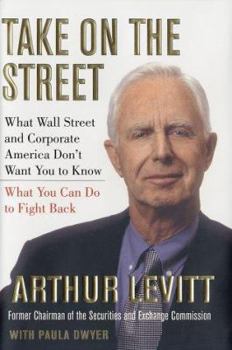Take on the Street: What Wall Street and Corporate America Don't Want You to Know-What You Can Do to Fight Back
Select Format
Select Condition 
Book Overview
In Take on the Street , Arthur Levitt--Chairman of the Securities and Exchange Commission for eight years under President Clinton--provides the best kind of insider information: the kind that can help... This description may be from another edition of this product.
Format:Hardcover
Language:English
ISBN:0375421785
ISBN13:9780375421785
Release Date:October 2002
Publisher:Pantheon Books
Length:352 Pages
Weight:1.44 lbs.
Dimensions:1.2" x 6.5" x 9.4"
Customer Reviews
5 ratings
Levitt's Life Story
Published by Thriftbooks.com User , 19 years ago
This book is mostly about Levitt's life story. There's not a whole lot of stuff you can learn by reading this book. It mostly says the same things other books say.... know what you buy, research what you buy, etc. However, there are 2 chapters in the book that were really good. One tells you how the ECN system works and the other one tells you what to look for and how to read financial statements. I would buy the book for these two chapters alone. The book is fairly cheap anyways. There's also a chapter about 401Ks that may interest those that haven't given much thought to retirement funds. Most of the book is about Levitt's life story. He bashes both Republicans and Democrats for obstructing the regular joe (or jane) investor. His life story is interesting but that's not the reason I bought the book.
*****
Published by Thriftbooks.com User , 20 years ago
(...)when I say I was completely impressed with this book and applaud Clinton for having appointed Arthur Levitt as Chairman of the Securities and Exchange Commission, you can be sure I mean it! This book is absolutely required reading for anyone even thinking of investing in the stock market. It was a total eye opener and written in an accessible, readable style. I highly recommend it.
Pithy and Informative
Published by Thriftbooks.com User , 20 years ago
Sometimes the truth hurts. In "Take on the Street," Levitt tells it like it is. A sobering account of Wall Street's hidden mishaps, the book examines such things as the opaque accounting practices that precipitated the Miltonic fall of Enron and Worldcom. The real merit of the book resides in a chapter Levitt devotes to the reading of financial statements, wherein he recapitulates the necessity of doing one's due diliegence before investing in any company. A classic, indeed.
Pitt makes me really miss Levitt
Published by Thriftbooks.com User , 22 years ago
Chances are anyone who rates this book as a 1 is a broker, member of AICPA, or serves on the Senate Banking committee. I am an investor who is very concerned about the greedily protected lack of transparency in the way public companies report their earnings or lack thereof, so I am giving this excellent book a 5. The book is useful because it describes how securities markets really work. It also functions as practical investment advice which details what is happening with your money after it leaves your hands. It should be required reading in MBA programs. Finally, voters will be much more informed about how Congress, through its protection of accountants, investment bankers, and brokers, is interfering with the efficient allocation of capital in the US economy.
Great for young professionals and business schools
Published by Thriftbooks.com User , 22 years ago
Levitt's book should be used by business schools scrambling to put together courses on business ethics and corporate governance. As a student working towards my MBA, I found this book to be of great value in an environment that lacks a curriculum to explain many of the issues underlying recent corporate scandals. As a young professional, this book has also helped me better understand and manage my mini-portfolio, including my 401K. Truly a valuable read that has given me much to think about as I manage my financial future.






